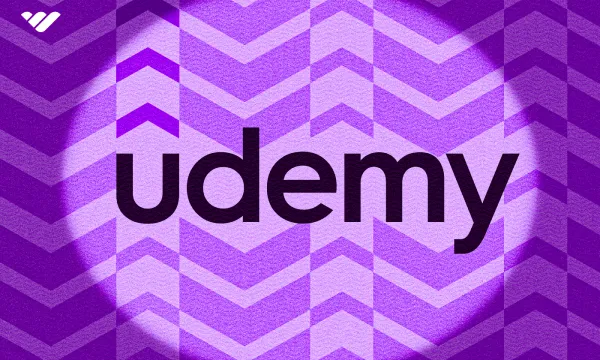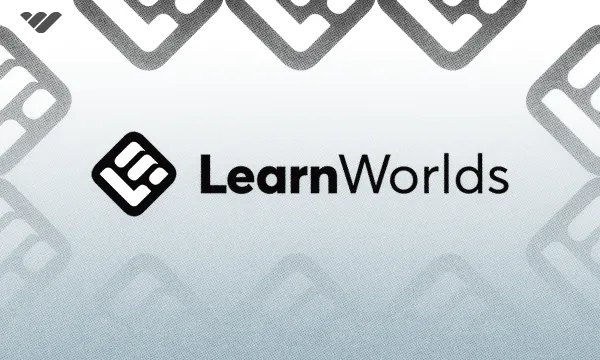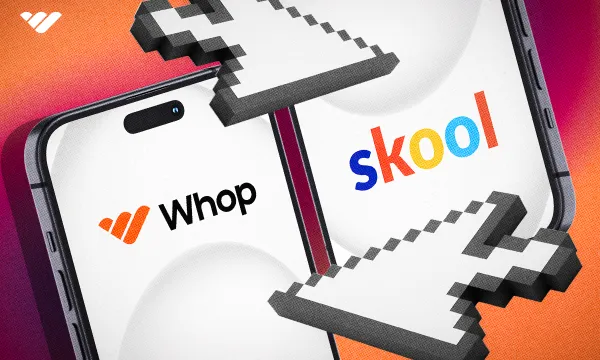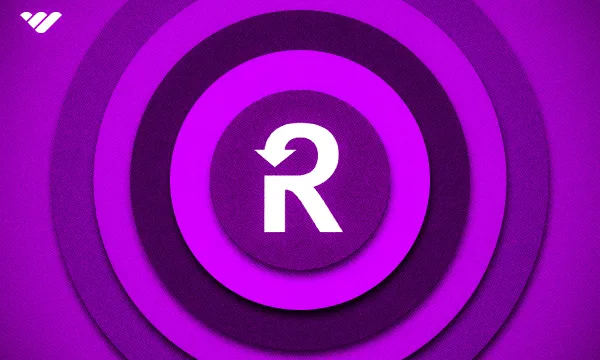If you've spent a long time learning a skill or honing a craft, and you'd like to share that with others, delivering online courses is a good way to make money and share your skills with a wide audience.
Udemy is a well-known online course platform that has a huge user base of people eager to try your courses. However, the revenue-sharing model used by the platform, and the way income can vary depending on whether the learner signed up for a course via your referral link or the online marketplace, can be off-putting for many would-be course-sellers.
Here, we look at ten alternatives to Udemy and consider their pros and cons, helping you find the right platform to launch your online course.
🏆Top Ten Best Udemy Alternatives
🥇1. Whop

Whop is a great option for course creators as it offers the best of both worlds -the platform has its own marketplace, but also allows course creators to share content via their own websites. Unlike the other platforms in this list, Whop isn't a pure course marketplace. It actually allows creators to share a wide variety of products, from digital downloads to access to communities, apps or blog posts, as well as courses. This means that creators are not limited to just selling courses - they can create communities around the course, sell extra digital downloadables to complement course content, and so much more.
Whop does offer a course creator tool, and also provides options for creators to share access to chat channels or live streams so they can deliver live coaching as well as asynchronous courses. There's no monthly membership fee to join the platform, and transaction fees are just three percent.
The flexibility of Whop is where it truly shines. For example, if you're selling a course on technical analysis trading, you could offer an add-on product of your trading signals, in addition to your course, and the Whop platform can handle access for both of these things.
Creators can reach an audience of learners via the Whop marketplace, or opt to sell their content via their own websites or social media platforms, giving themselves more control over their branding. Plus, Whop protects course creators with its anti-leaking beta, which is a feature to help ensure content protection within Whop courses. It's also possible to create apps and use Whop to sell access to them, so educators looking for a fully-branded mobile app-based learning experience could offer that via Whop, for lower fees than charged by some other platforms.
Whop Pros: Low fees and full control over your branding, 24/7 customer service, thriving marketplace, as well as the option to monetize all kinds of content.
Whop Cons: While the platform has a marketplace, it's not 100% course-focused.
2. Skillshare

Skillshare is an online course marketplace that's already home to thousands of online courses. It's popular with educators looking to teach technology-related subjects such as programming and design, but it also covers personal development, marketing, and lifestyle-related courses. If you can teach your subject through videos it could be suited to Skillshare.
Creating courses on Skillshare is easy. The course creator is intuitive to use and the platform's polished interface makes it popular with learners. The platform uses a subscription model with members paying a monthly or yearly fee to join Skillshare and get access to all of the classes and courses on the platform.
Every month, Skillshare pays 20% of the platform's subscription revenue to educators, based on the number of minutes of views earned by each teacher, and how much positive engagement the teacher had with learners.
Skillshare Pros: Popular marketplace and wide audience of learners.
Skillshare Cons: The revenue-sharing model makes it difficult to predict monthly earnings.
3. Thinkific
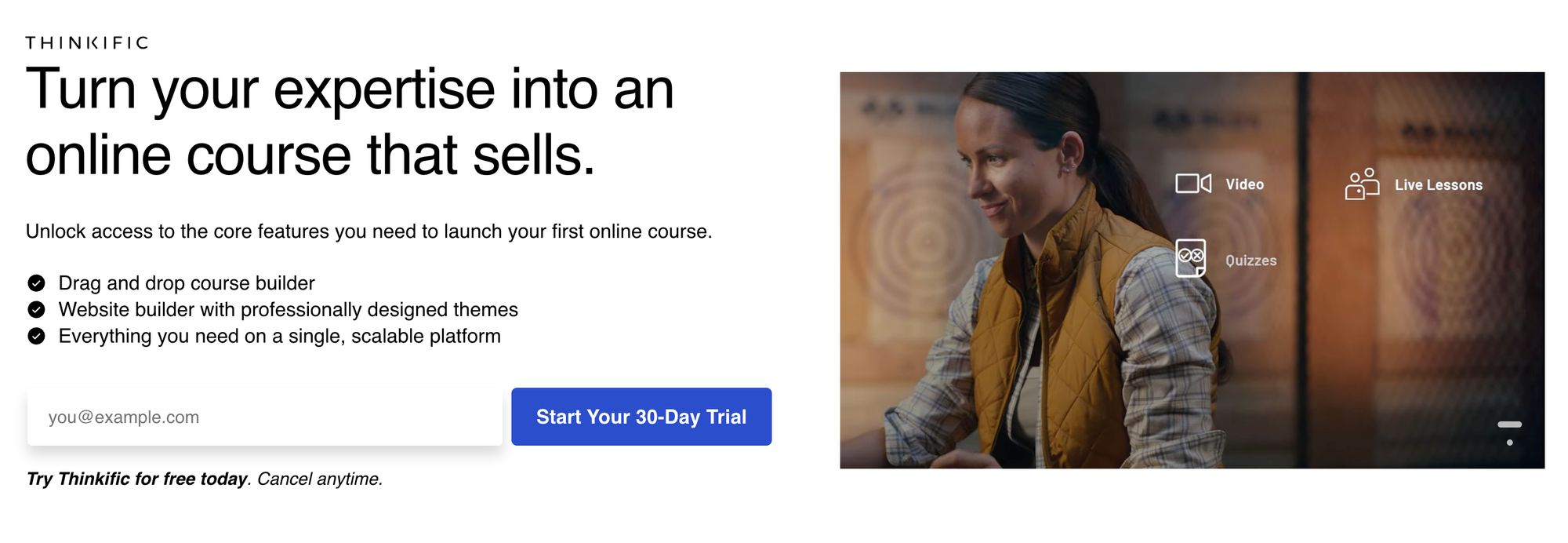
Thinkific is a polished course creation platform, but unlike Udemy and Skillshare, it's not a dedicated marketplace. Rather, the platform enables course creators to put together incredibly polished courses with their own branding, which they can then share on their own websites.
Thinkific gives course creators a huge amount of freedom. You can market the course via your own website, blog, or mobile app. If you already have a strong brand, perhaps from face-to-face coaching or social media presence, you can use that brand recognition to market your courses.
Creators can get started with Thinkific for free, although to access all of the features of the platform you'd have to pay a monthly subscription fee. However, if you're expecting to get a lot of subscribers for your online courses, the fee could well be worthwhile, as Thinkific charges no commission on courses sold. You will have to pay a small fee to your payment processor, but your earnings potential with Thinkific will most likely be higher than on a platform with a revenue-sharing model, assuming you're good at SEO and social media marketing.
Thinkific Pros: Control your branding and host courses on your own website.
Thinkific Cons: The lack of a marketplace makes it harder for smaller creators to get noticed.
4. Kajabi

In a similar vein to Thinkific, Kajabi allows creators to build online courses and sell them via the platform. Kajabi also allows creators to build websites and send out marketing emails, making it a one-stop-shop for course creators. The features offered on Kajabi are quite sophisticated, and the platform has a steep learning curve. It's also quite expensive, with the basic membership costing around $149 per month.
However, for that fee, creators get access to powerful marketing and analytics tools the website builder, and other features that are rarely seen on course creation platforms. If you're an influencer, life coach, or someone else who already has a strong brand and you're looking to sell courses or one-to-one coaching sessions online, Kajabi is a good option.
Smaller creators and those who are just getting started in the world of online coaching may be better off on a platform that offers revenue sharing and a marketplace. Kajabi provides tools for creators to use for marketing, but it doesn't directly help creators grow their audiences, and you'd need to have a steady stream of purchasers to break even on your membership fees.
Kajabi Pros: Website builder, email marketing, and analytics tools.
Kajabi Cons: High monthly fees, and no marketplace.
5. Teachable

Teachable is a coaching and course platform that supports group and one-to-one coaching, as well as asynchronous courses. It also allows creators to sell digital downloadables, such as PDFs or instructional videos. The platform is quite affordable, with a feature-limited free trial and a basic plan costing just $39 per month. There are also slightly more expensive plans offering access to more features, and lower (or zero) transaction fees, ensuring the platform scales with the audience of the creator.
Creators who are just testing the waters with the world of online courses will find even the most basic tier has some great features for engaging with students, producing quizzes, and drip-feeding content to learners over time. Those who are more experienced and have a steady income stream can take advantage of upsells, order bumps and other features to increase their income. They can also run referral programs, and even opt to have the Teachable branding removed from their courses to ensure a more professional look.
Teachable Pros: Run traditional courses and real-time coaching sessions.
Teachable Cons: Limited free tier, and high transaction fees on the lower subscription tiers.
6. Domestika
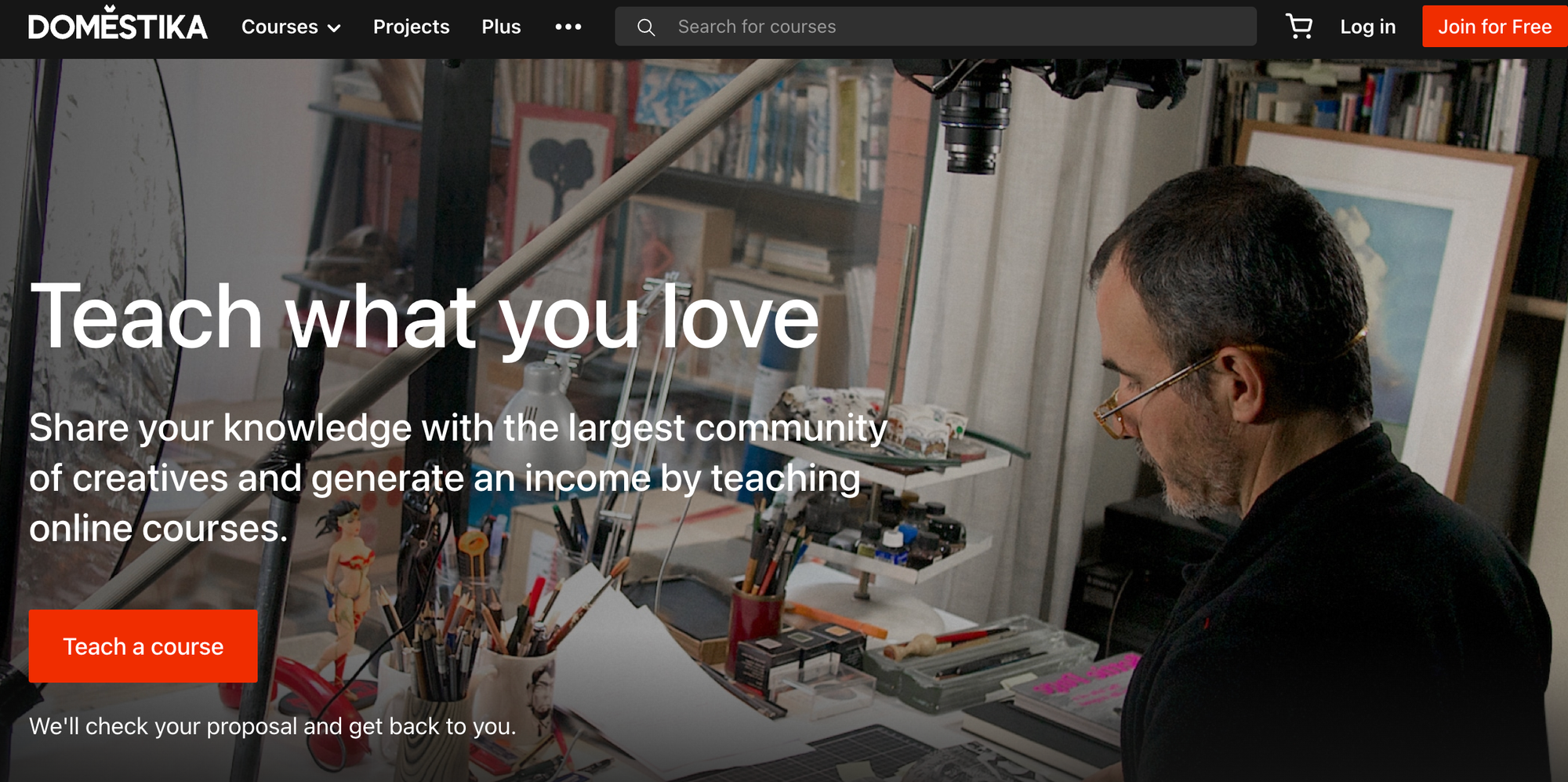
Domestika is less well-known than some of the other online course platforms, but it's hardly a new entry into the teaching marketplace. The platform has been around for several years and has carved out a niche as the go-to place for creatives. It offers paid courses on crafts, illustration, creative software and design. Other content is welcome too, and there are some programming courses to be found on Domestika as well as courses on marketing and business, but it's obvious from a look at the course marketplace what the focus of the platform is.
We've included Domestika in this list, despite its relatively narrow focus, because the quality of the courses on the platform is very high. The careful vetting of any courses published on Domestika is something that makes consumers feel confident enough to open their wallets and join the platform. If you're a creative professional with a passion for teaching, it's worth submitting a proposal to the team. If your proposal is approved, they'll get in touch with you and work with you to produce the course.
Unlike other platforms listed here, Domestika covers the production expenses and vets the course just like a traditional publisher, then pays a royalty on the course purchases. This hands-on model is unusual in the course creation world, but does mean that Domestika courses have a very good reputation.
Domestika Pros: High-quality courses and respected marketplaces.
Domestika Cons: Limited subjects and course proposals must be vetted by the team.
7. Maven

Maven is an online course marketplace with an interesting twist. Where most of the platforms included in this list focus on asynchronous courses, Maven's specialty is live cohort courses. Students can enroll in a course together and are expected to complete the course together in a set time. While many other platforms do offer a basic way to deliver online coaching through Zoom or Teams integrations, Maven is designed with this feature in mind, and offers a much smoother experience for learners and educators alike.
Since Maven's courses are delivered live, the courses are more intensive and can cover quite complex topics effectively. They also cost learners far more, with some courses costing thousands of dollars to join. The platform takes quality seriously. They vet their instructors carefully and review course content to ensure that it's high quality.
Producing engaging content for Maven is a more complex and time-consuming process for educators. However, those who can complete the vetting process could earn as much as $30,000 for each course they publish on the platform.
Maven Pros: High potential earnings for cohort-based courses.
Maven Cons: Strict quality controls and vetting processes.
8. Coggno

Creators looking for a workplace-training-focused course platform may wish to take a look at Coggno. The marketplace includes courses covering everything from engineering to food safety, aiming to let creators monetize their training curriculum. The marketplace currently has more than 10,000 courses available, ranging from free introductory courses or short video modules to more comprehensive offerings with several hours' worth of content.
To publish a course on Coggno, you must be an expert in the topic of the course. However, the vetting process is less comprehensive than the one used by Maven or Domestika. Creators have more freedom to set the price of their course and decide on the length. In addition, creators have the option of setting up their own branded web shop, giving them more control over their branding. It's possible to publish courses for free on Coggno just to test out the system, or publish very short modules for just a few dollars. Longer courses can cost $100 or more.
Coggno uses a revenue-sharing model, similar to the one used by Udemy. Creator earnings depend on whether the sale is made through the creator's own branded webshop, or via Coggno's marketplace or syndication network. Depending on the way the sale was made, Coggno's commission could be between 20% and 50%.
Coggno Pros: Low barrier to entry, higher revenue share than offered by Udemy
Coggno Cons: A specific niche and a smaller user base of learners, so discoverability may be poor.
9. Edureka
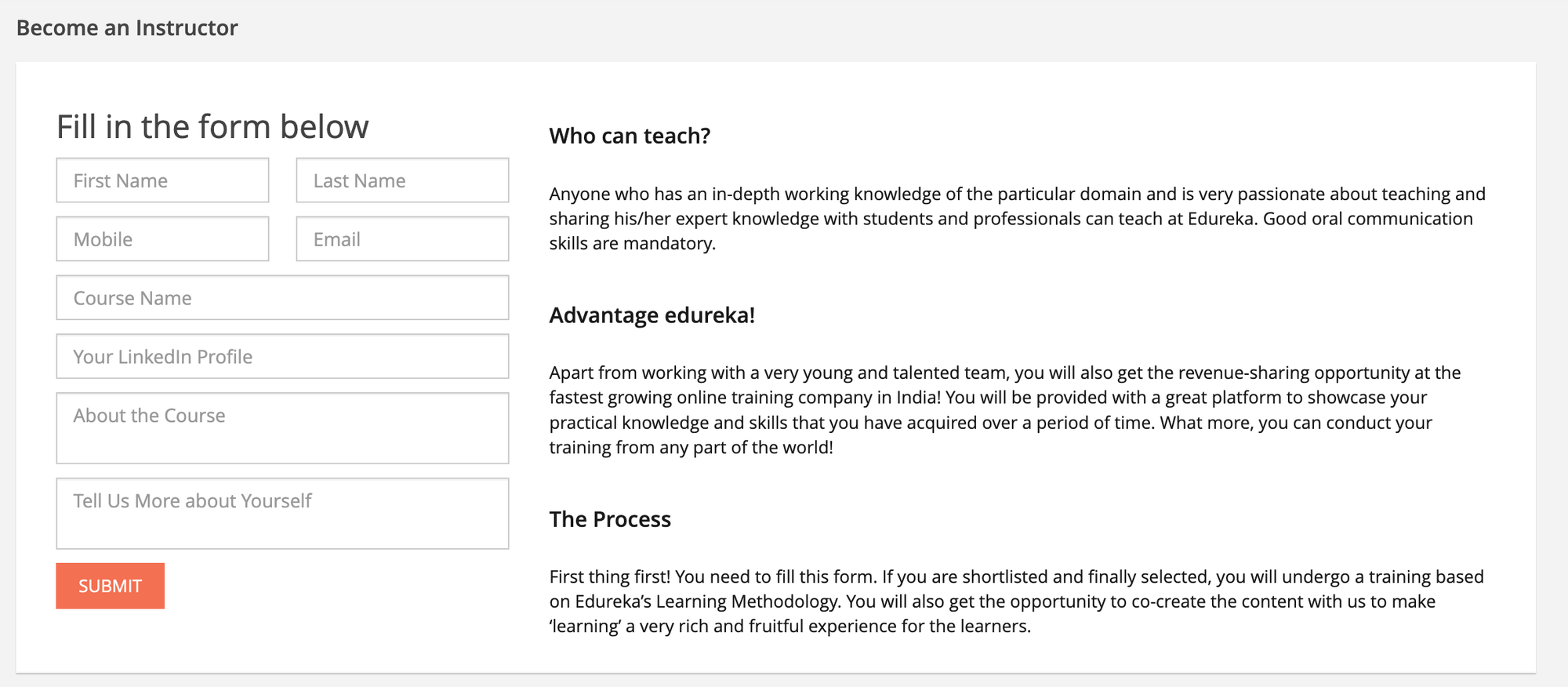
The Edureka online course platform focuses on technology, digital marketing, and ecommerce courses. It's aimed squarely at IT professionals, and recruits subject-matter experts to produce courses on highly focused topics such as specific software applications or technical skills.
Edureka courses cost more to join than courses on Udemy or Coggno, in part because they're more comprehensive and carefully vetted, but also because the team has a strong focus on ensuring learners complete their studies. When a student enrolls in an Edureka course, they'll be contacted by a support team who will work with them to resolve any issues and help remove barriers, giving the learner the best chance possible to complete the course.
Edureka's emphasis on quality means it has a good reputation as a certification provider. If you're interested in producing courses for the platform, you'll need to be an academic or a professional in the area of your course, and you'll need to complete the platform's course creation training platform. This course covers everything educators would need to know to learn how to create engaging and entertaining educational materials on the platform.
There's a lengthy seller approval process, and the course will be vetted too. However, those who do manage to get through this process have the chance to enjoy high earnings from their expertise.
Edureka Pros: Strong reputation among learners in the IT field.
Edureka Cons: Lengthy vetting process for course creators.
10. Outschool
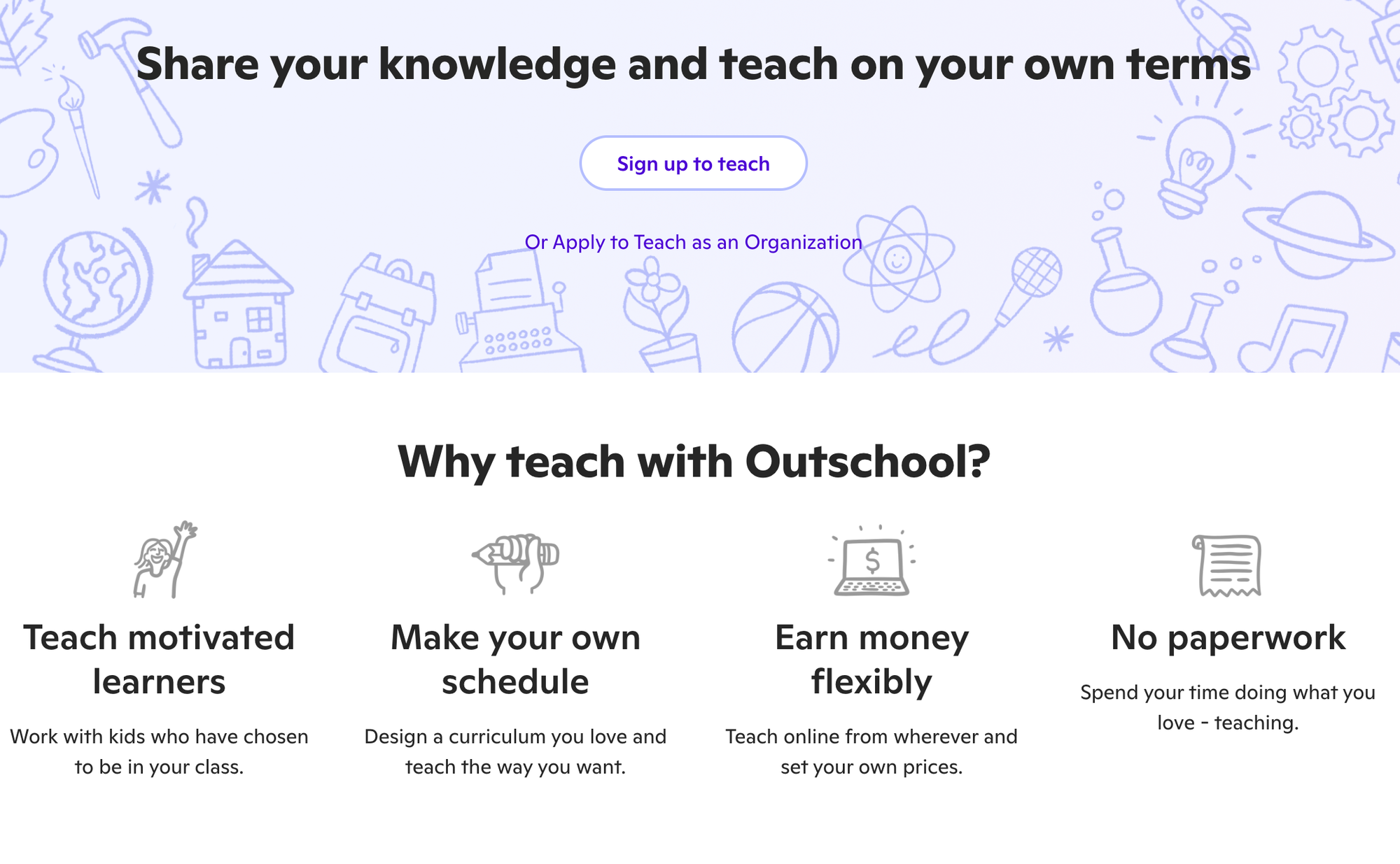
Content creators who are looking to offer courses for younger learners may find Outschool to be a good choice for them. This platform focuses on offering educational materials for school children, covering topics such a math, science, languages, and technology.
Despite Outschool being aimed at younger learners, course creators do not have to be certified teachers to upload content to the site. However, they do have to be able to prove their proficiency in their chosen subject. Any courses uploaded will be vetted for quality. Listing classes is free, but the platform takes a 30% commission on all enrollments.
Outschool's focus is live coaching and cohort courses, rather than asynchronous classes. So, creators will need to take an active role in teaching the courses. This isn't a course platform that allows creators to simply upload a course and enjoy a passive income. However, it's unique in its focus on younger learners and offers a good earning opportunity for course creators interested in that demographic.
One thing to be aware of with Outschool is that the platform is open only to teachers from the US, UK, Canada, Australia, New Zealand or South Korea. In addition, teachers must pass a criminal background check before delivering their first course, as they will be interacting with students in real-time.
Outschool Pros: Reach an audience of younger students.
Outschool Cons: Focused on cohort courses and live coaching sessions.
Choosing a Platform for Your Courses
If you're a creator and you're thinking of running online courses, consider the material that you will be covering and whether there's a popular platform that covers that market. It's also worth thinking about how many students you expect to get in the first few months, and whether you're happy to list courses on an existing platform, or if you'd prefer to have more control over your brand and the look and feel of your course.
Platforms such as Teachable and Kajabi could be a good option for creators with an established following who are happy to pay a monthly subscription fee for more sophisticated features. However, Whop offers a great balance between low fees, ease of use, and control, as you can choose how you share your course and whether you'd like to market it through the Whop store.
Selling Your Online Course with Whop
Whop has already processed more than $250,000,000 in sales for its creators - so why not join them and start making money from your online course? It takes less than 10 minutes to get set up as a seller on Whop, and you can start selling your course for free, with just a 3% transaction fee on sales.
Join the growing number of entrepreneurs monetizing their skills and passion on Whop - start selling your course today!
